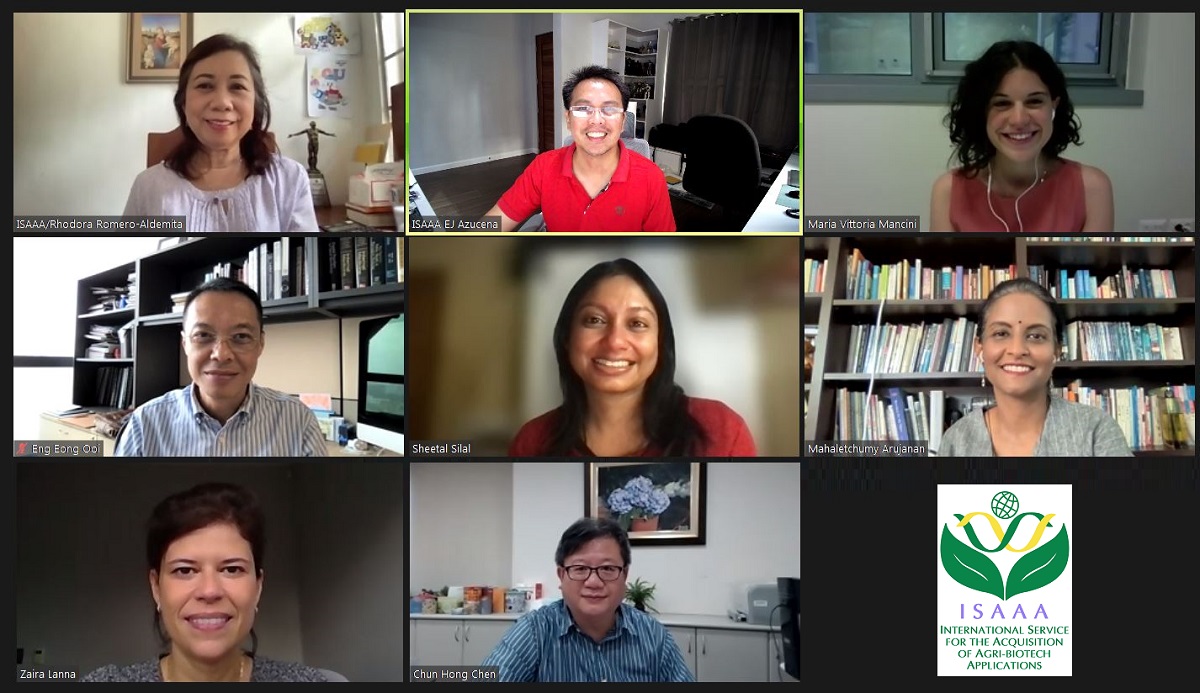
Gene Drives Offer Sustainable Management of Vector-Borne Diseases -Experts
July 14, 2021| |
Dengue and Malaria are transmitted by mosquitoes and cause millions of deaths across the globe every year. Gene drives using genetically modified mosquitoes offer an effective, economical, and less labor-intensive solution to help fight lethal viral diseases.
The webinar Can gene drive eliminate vector-borne diseases? was live-streamed via Zoom on July 8, 2021. It was hosted by ISAAA, in partnership with the Biotechnology Information Centers and the Outreach Network for Gene Drive Research. Experts from Singapore, Taiwan, and Italy were invited to speak about gene drive as a means to mitigate vector-borne diseases and their limitations.
Prof. Eng Eong Ooi of the Programme in Emerging Infectious Diseases of the Duke-NUS Medical School in Singapore provided an overview of the current Malaria and Dengue in Africa and Asia. He explained that millions of people become infected with both diseases every year, and some cases, especially in children, result in death. While pharmaceutical companies continue to develop anti-malarial and anti-dengue drugs to control the diseases, the efficacy of these medicines would either fade throughout time or even fail at trials prior to their approvals.
Gene drive is a tool that can help mitigate diseases. Malaria and Dengue are transmitted by mosquitoes, an insect that is a threat to public health according to Dr. Chun Hong Chen of the Institute of Infectious Disease and Vaccinology of the National Health Research Institutes in Taiwan. When an infected person is bitten by a mosquito, the mosquito becomes the virus' vector. Once it lands and bites other people, they also become infected. The cycle continues and the diseases spread, sometimes uncontrollably. Traditional methods such as clean-up drives and chemical fogging are currently being used to control the mosquito populations, but these are expensive and labor-intensive said Chun. Gene drive is a more sustainable and cost-efficient solution.
Dr. Maria Vittoria Mancini of the Polo di Genomica of the Genetica e Biologia in Italy supported the statements of her co-speakers. Aside from the advantages of gene drive, Mancini also explained the technology's limitations such as the reduced efficacy of the technology over time, public perception and ethical concerns, international regulations, and the ecological impacts. While there is an increasing need for additional innovation in vector control interventions, a transparent, inclusive, and well-informed discussion for responsible evaluations and development of genetic control technologies is also crucial.
The webinar was opened by ISAAA Global Coordinator Dr. Mahaletchumy Arujanan and moderated by Dr. Sheetal Silal of the Modelling and Simulation Hub Africa at the University of Cape Town, South Africa. ISAAA SEAsiaCenter Director Dr. Rhodora Romero-Aldemita gave the closing remarks.
Watch the full session on ISAAA's YouTube channel. The next session of the Gene Drive Webinar Series titled Regulatory and governance considerations for gene drive research is scheduled for July 22, 2021. Register now.
Subscribe to the Outreach Network for Gene Drive Research Newsletter to learn more about the technology.
| |
You might also like:
- Scientists Develop Gene-Edited Mosquito to Help Eliminate Malaria
- Harmonized Regulations Key to Optimizing the Potential and Benefits of Gene Drive Technology
- Experts Explain How Gene Drives Control Invasive Species
Biotech Updates is a weekly newsletter of ISAAA, a not-for-profit organization. It is distributed for free to over 22,000 subscribers worldwide to inform them about the key developments in biosciences, especially in biotechnology. Your support will help us in our mission to feed the world with knowledge. You can help by donating as little as $10.
-
See more articles:
-
News from Around the World
- WHO Releases Framework for Governance of Human Genome Editing
- Regulatory and Governance Considerations for Gene Drive Research
- Government Decisions Influence Consumer Perceptions towards GM Foods, Study
- Gene Drives Offer Sustainable Management of Vector-Borne Diseases -Experts
- New South Wales Lifts 18-year-old Ban on GM Crops
- Engineered Bacteria Produce All Colors of the Rainbow
- Genetic Analysis Could Help Predict Sunflower Properties
- EFSA Releases Assessment of GM Cotton GHB614 for Renewal Authorization
- Potential of Protein-Rich Faba Beans Unlocked; Anti-Nutrient Gene Discovered
-
Plant
- Efficient Engineering Platform in Methylotrophic Yeast Developed
- CABBI Reports First Successful Precision Breeding of Sugarcane Using CRISPR-Cas9 Genome Editing
- Study Reveals Citizens' Reactions to Genome Editing in Five Countries
-
Read the latest: - Biotech Updates (January 21, 2026)
- Gene Editing Supplement (January 28, 2026)
- Gene Drive Supplement (February 22, 2023)
-
Subscribe to BU: - Share
- Tweet

